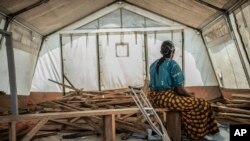The U.N. deputy humanitarian coordinator for the DRC, Suzanna Tkalec, said at a briefing Monday in Washington that women and girls in the provinces of North Kivu, South Kivu and Ituri continue to be exposed to alarming rates of gender-based violence due to the resurgence of violence between militant groups and government forces.
Tkalec said a recent report from the aid organization Doctors Without Borders found that some 90,000 women and girls had sought medical assistance after being assaulted and raped this year. The report said those who came forward likely represent only a fraction of the total number of victims.
Tkalec says survivors may be unable to reach lifesaving gender-based violence services or report their abuse, out of fear of stigmatization by their communities or retaliation by perpetrators.
“A lot of this is really, due to the extreme vulnerability of women and girls,” Tkalec said.
She says OCHA’s ability to help is largely inadequate because its 2023 humanitarian response plan is only 38% funded.
“Because there is always a competition among the new crises that arise, the DRC keeps falling down the line of international crisis that need attention,” Tkalec said.
